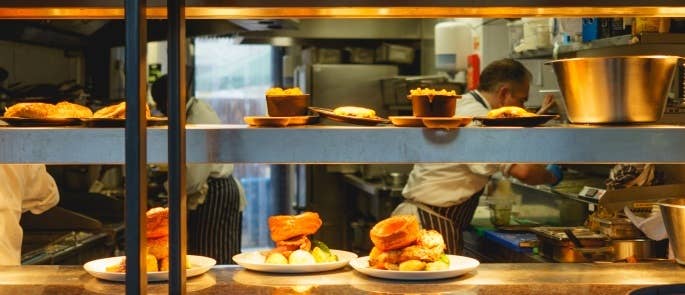Managing Mental Health & Wellbeing In Hospitality
The phrase “If you can’t stand the heat, get out the kitchen” is difficult to take lightly as stress in hospitality becomes a problem the industry can no longer ignore.
Hospitality is the third largest employment sector in the UK. Clearly, going out continues to be as popular as ever. But for many, working in this environment is not considered a sustainable option due to the reported rates of burnout in the industry.
As new workers in all sectors demand a better work-life balance, many are choosing careers away from the hospitality industry, contributing to an acute skills shortage.

The topic of stress in the workplace has led to a spotlight on mental health and wellbeing in hospitality, especially considering the demands of millennials and centennials for a better work-life balance. According to our most recent hospitality report, perceptions around stress in the workplace were among the top 5 factors preventing people from taking on hospitality roles. When looking to address the issue of retention and recruitment in hospitality, it’s clear that the industry needs to recognise the pressures their employees face and look at what they can do to help them.
So, why is stress such a big factor in hospitality? How we can help reduce it? High Speed Training’s hospitality experts, Jamie Hogg and myself, will give our first hand experiences of mental wellbeing in hospitality, having managed restaurants, cafes and bars for over 10 years.
Why is Stress So Common in Hospitality?
There is no doubt that working in hospitality is high-pressure – you have to constantly react to events outside of your control, and your ability to do a good job is dependent on the outcome of your own performance. For many, such a dynamic environment is an attractive challenge, with plenty of opportunities to make an impact.
However, this pressure becomes unwanted stress when we find ourselves constantly battling without reprieve. As with any role, when there are too many demands made of us – and we don’t have the resources to meet them – stress can drag us down.
It is important to distinguish between pressure and stress so that we understand when we may be feeling challenged as opposed to overwhelmed.

The demands faced in hospitality are varied. There are numerous physical demands such as working long hours, being on your feet for long periods of time and lifting heavy stock and equipment in what is often a very hot environment. Furthermore, many workers will opt out of the working time regulations. If they do this, it means they are legally allowed to work more than 48 hours a week – most chefs will work upwards of 60 hours a week. Opting out also means they aren’t legally entitled to a minimum daily rest period of 11 hours between shifts, nor a break every 6 hours, nor a minimum weekly rest period of 24 hours in addition to the 11 hours’ daily rest. Without these enforced breaks, the physical demands of working shifts can be especially punishing.
It is also important to consider the number of mental demands from working in hospitality. Working in kitchens is often compared to being in the army. Whilst there can be a strong sense of camaraderie in teams, there is also a steep learning curve as you work up the kitchen hierarchy, with some employees reporting feeling bullied and unsupported at work.
In a survey by RSPH, 41% of hospitality workers said they had received verbal abuse from a co-worker, while 43% reported receiving verbal abuse from a manager.
Another impact on mental health can come from the demand for immediate service – in no other industry do you prepare a unique product from start to finish every 15 minutes. In hospitality, you work in an environment where everything has a time demand – whether that is sending out food for a table at the same time or making sure everyone’s drinks arrive promptly, it all needs to be done with perfectly timed cohesion and often for several tables at once.
In addition to this constant assessing and reassessing of multiple situations in your work environment, the feedback your service receives is immediate. You know right away if there is a problem, less quickly if all is well. If there is a problem, you have to solve it as quickly as you can, or risk upsetting your guest. This requires forethought, it requires knowledge of what everyone else is doing – who can help and how? You have little time to process and your reaction needs to be right, as well as quick.
According to High Speed Training’s hospitality expert, Jamie Hogg
Some people thrive in such high-pressure environments and can relish the challenge of gaining success against all the odds. Yet, when the pressure becomes too much and people don’t receive the support they need, the consequences can be severe, for both the individual and the business.

When Pressure Becomes Stress
Constantly being reactive and relying on others to do their job well isn’t easy. It requires mental strength to be able to cope with the pressure this puts us under. In hospitality roles, there is rarely any margin of error, so being the best you can be and doing the best you can do is understandably difficult. Often it can feel like you don’t have any spare budget, ingredients, staff, or time, nor support from your colleagues or manager.
Good, healthy pressure can quickly become negative, causing stress if we get stuck in a cycle feeling like we constantly fail to meet demands.
Stress can lead to unhealthy coping mechanisms, such as drink and drugs, which is often highlighted by the media. This all takes a huge toll on employees, with stress being the main reason for employee burnout and chef depression.
There is no doubt this is a huge problem. Suicide in the hospitality industry is alarmingly high. In June 2018, celebrity chef Anthony Bourdain took his own life which shook the hospitality industry. Though this was a high profile case, it is sadly not an isolated occasion. Whilst the conversation around mental health has increased, we still have a long way to go.
Media Effect on Stress in Hospitality
The rise in popularity of TV shows such as Hell’s Kitchen, Masterchef and Amazing Hotels, brings the bustling world of hospitality into peoples’ living rooms. This has created a fascination with the drama of a kitchen, or the intensity of a hotel. As we engage with instant access social media channels, such as Instagram or TripAdvisor, they can provide a platform on which to showcase the good, the bad and the ugly of hospitality. For hospitality workers this brings additional pressures as members of the public can scrutinize every detail and negative feedback can spread.
Whilst this interest is great for the economy of the industry, it can be difficult for workers. Those who work in hospitality are often creative people who love to work with the tools of ingredients to produce amazing dishes and drinks, with a flair for theatre and art. They are those who can think outside the box and come up with solutions to a vast array of guest problems.

However, coming up against a wall of constant, public criticism from guests no doubt takes its toll. Being then subject to worldwide social media feedback can easily stifle the creativity and the bravado of many.
A chef friend of mine had a favourite saying in the kitchen – “Your opinion isn’t in my recipe!”. Without their creative outlets, employees can become stuck and disheartened and often rely on strength of conviction to see them through, which in turn can have a negative impact on their mental health.
How Can We Reduce Stress in Hospitality?
It’s important we remember the distinction between being under pressure and being stressed. If levels of pressure at work are perceived to be high, and the individual is unable to manage and cope, this can cause someone to experience undue amounts of stress.
Since the 2008 recession, the hospitality industry is one of the few that has continued to grow. We often hear from our own customers that finding a good chef is becoming harder and harder. However, it is important to consider that demand has simply outstripped supply. Being a good chef in today’s job market gives you more power and options than it ever did.
To prevent more good people from leaving the industry due to stress and burnout, we should aim to do everything possible to help individuals.
There are a number of proactive steps we should take, and also encourage others in the industry to follow too:
Find and Promote a Better Work-life Balance
We know that those who work in hospitality are the people who are there working while you’re out on a Friday night, who serve you Sunday lunch at your favourite country pub, who bring out a birthday cake at a family meal. They work every bank holiday, every Christmas, Mother’s Day and Father’s Day, but we must remember that employees are people too. Whilst, understandably, the demands of the business need to be met, we should work together to make sure the demands of our employees are considered equally as important. Restaurateurs like Sat Bains have taken this on board and open only four days a week, guaranteeing his staff three days off for rest and recreation – to have a life outside of work.
When I managed a restaurant, I would always try to be fair when planning shifts over the festive period. For example, if someone is working Christmas eve and Christmas Day, give them New Year’s Eve and New Year’s Day off, so that they get some down time. Encourage your staff to tell you when they have family events, or important dates they would like to have off and accommodate them whenever possible. The key here is planning.
Strive for Staff Flexibility
We all have days where we struggle to be animated but when you work in a customer facing role, it can be especially hard. We can improve health and wellbeing in hospitality by encouraging our staff to talk when they are struggling. Be more supportive and where possible, swap shifts around or arrange cover so they can have a day off, or allow them to use sick leave for mental health. The hospitality industry tends to employ a lot of part-time staff, such as those who may be studying at the same time as working. If you know an employee has exams coming up or needs time off for university interviews, for example, give this flexibility willingly whenever possible.
Recognise the Creativity of Chefs
Too often I’ve seen genius chefs who work hard for promotions, but, when they reach their goal of Head Chef, they are no longer expected to be in the kitchen. Instead, they are given stacks of paperwork to churn through. We ought to encourage chefs to continually strive to be creative, to constantly try new things and push themselves and their team. This will inspire those who work with them and will raise the positivity of the workplace.
Offer Mental Health Training
The importance of mental wellbeing is increasingly being recognised and working in hospitality is not exempt from its’ health and wellbeing problems. By starting the conversation of mental health with our colleagues we can make sure people know where and how they can get help.
Offer Skills Training
In addition to the required compliance courses, your staff might benefit from other training. Management Skills and Customer Service training could help them start productive conversations with their staff. Social Media Training could help employees reach their customers online. By investing in training, you demonstrate that you care about your employees, and this will encourage them to develop themselves.
Online courses can be a good option in industries where time and resource are precious – check out the library of compliance and personal development courses offered by High Speed Training.
Offer Perks
Anyone who works in hospitality will understand how going the extra mile can make your guests feel special. The same is true for your staff. Staff perks don’t have to be huge; it could simply be offering free food on a long shift. In one of my hospitality experiences, we shared a kitty for ‘research’ – essentially to encourage staff to go and try items in other businesses. Whilst assessing the competition and gaps in the market, we were able to bond as a team and feel valued by our employer. The important thing is to show that you care about your staff so they know they are respected, from the top to the bottom.
Reward Staff
While it can be easy to focus on the negatives, make sure key achievements don’t go unnoticed. Give a shout out to your solid workers who are always on time, those who support others and those who are achieving. Incentivise those who challenge themselves to do better – these people will be your future leaders and managers. Try to encourage positive outlooks at management level too. Simple things do work, like star worker of the week, or rewards for those with the most positive reviews in a month. Make it fair and encourage your staff to take up the challenge.
Without these changes, we will continue to struggle to fill in the worker deficit in hospitality roles. Younger generations are used to having things now, and their careers are no different. If we want people to stay in the industry, we have to offer something more than long hours, low pay and unglamorous jobs. We have to encourage creativity, self-development, and a better work-life balance.
Need a Course?
Our Mental Health & Wellbeing in Hospitality Course will provide you with the knowledge you need in order to maintain a healthy work-life balance in the hospitality industry, the positive steps to take and how to react if you find yourself or someone you work with suffering from mental ill health.

Where Can I Get Help?
According to the Nestlé research At Boiling Point, almost half of chefs wouldn’t approach their colleagues with their mental health concerns. Similarly, in a short survey from The Caterer, over 70% said they felt there was still a stigma around mental health.
However, there are a number of places where you can get help. The UK charity MIND is especially good for getting you the support you need.
There are also several hospitality-related mental health support channels available:
- Healthy Hospo – An initiative launched by bartender, Tim Etherington-Judge after he suffered a breakdown in 2016. Healthy Hospo has a number of online resources to support the mental health conversation, in addition to events and workshops employees can attend.
- The Pilot Light Campaign – this was recently launched by chef Andrew Clarke in partnership with Time to Change. Both of these initiatives are there to help those who work in hospitality talk about mental health, and to offer them the support they may need.
Only by committing to support the mental health and wellbeing of those who work in our hospitality services, can we really change the industry for the better.
What to Read Next:
- 20 Ways to Sabotage a Food Hygiene Inspection
- Dealing with Customer Complaints in Hospitality
- Employee Turnover in Hospitality: Causes and Retention Strategies
- Mental Health Courses








